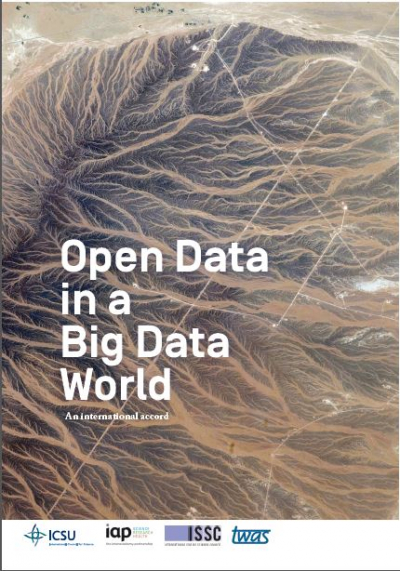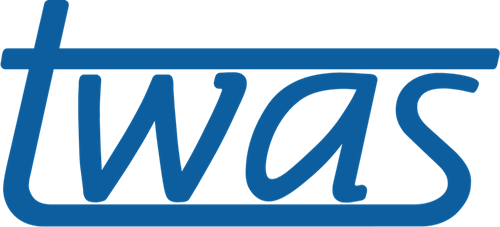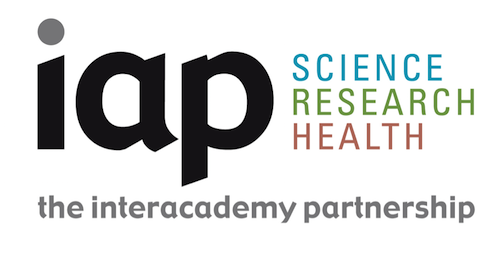


Science International 2015 launches a campaign for "Open Data in a Big Data World" at Science Forum South Africa in Pretoria
PRETORIA, South Africa – Four major international science organisations are calling for global endorsement of an accord to help assure open access to volumes of "big data" that increasingly are the basis of research and policymaking.
The four organisations have developed and support an accord that includes a set of guiding principles on open access to big data, necessary to protect the scientific process and assure that developing countries can participate more fully in the global research enterprise. Limits on access to big data knowledge, they warn, raises the risk that progress will slow in areas such as advanced health research, environmental protection, food production and development of smart cities.
Leaders of the organisations that participated in the 2015 Science International meeting called a press conference for 09.15 a.m. Wednesday 9 December 2015 at Science Forum South Africa to discuss the accord and the plans to seek endorsements in a 12-month global campaign. Phil Mjwara, director-general of South Africa's Department of Science and Technology, is expected to attend. The press conference will be held in the Amber Room of the CSIR International Convention Centre in Pretoria.
“As the data revolution accelerates and the scientific potential of big data becomes clearer, it is timely that the major representative bodies of international science promote the importance of open data as means of maximising creativity, maintaining rigour and ensuring that knowledge is a global public good rather than just a private good," said Geoffrey Boulton, president of CODATA, ICSU’s Committee on Data, and leader of the working group that developed the accord.
The digital revolution has created an unprecedented explosion in the data available for analysis by scientists, policymakers and others. Extremely large data sets, or ‘big data’, are the engine of this revolution; they help researchers to recognise subtle but powerful patterns in areas ranging across the sciences, from security to genetic research and human behaviour. Such data will be critical to analysing and achieving the UN's new Sustainable Development Goals. The "privatization of knowledge", however, could constrain this research.
For the first time, four organisations representing science at the highest level are speaking with one voice and have committed to mobilising their members to ensure that the principles laid down in the accord can be rolled out globally.
They join governments and inter-governmental bodies that have made the case for open data as a fundamental prerequisite in maintaining the rigour of scientific inquiry and maximising public benefit from the data revolution in both developed and developing countries.
The four science organisations behind the "Open Data in a Big Data World" campaign are: The International Council of Science (ICSU); the InterAcademy Partnership (IAP); the International Social Science Council (ISSC); and The World Academy of Sciences for the advancement of science in developing countries (TWAS). Collectively, they represent more than 250 national and regional science academies, scientific unions and other organisations worldwide, with individual members at the highest levels of scientific research, policy and education.
Science International 2015 is the first in a series of meetings to be held by the four organisations. The purpose of the 2015 event was to develop the "Open Data in a Big Data World" accord. Organisers and working group members from some 10 countries in Africa, Asia, Europe, Latin America and North America participated in the meetings to shape the accord.
Over the next 12 months, the campaign will collect endorsements for the accord from other science, education and policy bodies, with final results anticipated in third quarter 2016.
The accord identifies the opportunities and challenges of the data revolution as an overarching interest for global science policy. It proposes 12 principles to guide the practice and practitioners of open data, focused on the roles played by scientists, publishers, libraries and other stakeholders, and on technical requirements for open data. It also assesses the "boundaries of openness".
"Open data should be the default position for publicly funded science," the accord says. "Exceptions should be limited to issues of privacy, safety, security and to commercial use in the public interest. Proposed exceptions should be justified on a case-by-case basis and not as blanket exclusions."
Leaders of the Science International partner organisations concurred that the accord provides a valuable guide to scientific responsibility and big data policy.
"Open access to data will be essential if developing countries are to join in the benefits of the big data revolution," said Romain Murenzi, executive director of The World Academy of Sciences. "If developing nations are left behind, if they are unable to make a full contribution to the global research enterprise, that will be costly not only for them and their people, but for all nations."
Alberto Martinelli, president, International Social Science Council: "Big data creates tremendous opportunities for social research. The social sciences have long explored the ethical implications of data collection, the protection of privacy and the risks of data commercialization, and it is critically important that social scientists engage in the debates around big and open data, to ensure that rapid developments do not result in a deepening of existing knowledge divides."
Added InterAcademy Partnership President Mohamed H.A. Hassan of Sudan: "Academies of science are important drivers of science policy in their countries. We hope the more than 130 national and regional member academies of the InterAcademy Partnership will now support the principles set out in this accord, take them to their governments and national science systems, and collaborate on moving towards their implementation."
ICSU President Gordon McBean of Canada: "Data is the fabric of modern science. The challenge for science today is to keep pace with the digital revolution, and for that we need a strong international framework setting out the principles for an open data regime that enables all nations and societies to benefit equally from the opportunities it presents."
*****
About us:
Science International is a series of annual meetings that bring together leaders of the International Council for Science (ICSU) and its Committee on Data for Science and Technology (CODATA), the InterAcademy Partnership (IAP), The World Academy of Sciences (TWAS), and the International Social Science Council (ISSC) to address a key science policy challenge. Science International meetings aim to have a constructive impact; reports, briefings and accords will be produced by relevant experts nominated by each Science International partner organisation. "Open Data in a Big Data World" is the first Science International initiative.
The International Council for Science (ICSU) is a non-governmental organisation with a global membership of national scientific bodies (122 members, representing 142 countries) and international scientific unions (31 members). ICSU mobilises the knowledge and resources of the international scientific community to strengthen international science for the benefit of society.
CODATA, the Committee on Data for Science and Technology, is an interdisciplinary body of ICSU that works to improve the quality, reliability, management and accessibility of data in science and technology. Founded in 1966, CODATA promotes international collaboration for open scientific data in three strategic priority areas: promoting open data policies, advancing the frontiers of data science and mobilising capacity for data science and data handling.
The World Academy of Sciences for the advancement of science in developing countries (TWAS) works to advance innovation and sustainable development through research, education, policy and diplomacy. TWAS, a global science academy, has some 1,175 elected Fellows from more than 90 countries; 16 of them are Nobel laureates. TWAS annually offers USD1.7 million in research grants and over 500 PhD and postdoctoral fellowships.
The InterAcademy Partnership (IAP) is an umbrella organisation bringing together IAP - the global network of science academies, the InterAcademy Medical Panel (IAMP) and the InterAcademy Council (IAC). Its 130 national and regional member academies harness the expertise of scientific, medical and engineering leaders to advance sound policies, promote excellence in science education, improve public health and achieve other critical development goals. The InterAcademy Partnership will be formally established in March 2016.
The International Social Science Council (ISSC), a membership-based non-governmental organization, is the primary global body representing the social sciences, including economic and behavioural sciences. Its mission is to strengthen social science to help solve global priority problems. Through its members and programmes, the ISSC reaches hundreds of thousands of individual social scientists working across a wide range of disciplines and representing all parts of the world.
Follow the link here to the Accord: http://www.icsu.org/science-international/accord which is also available in French, Polish and Spanish.
To download the PDF file of this press release, please see below.
 |
 |
 |
 |